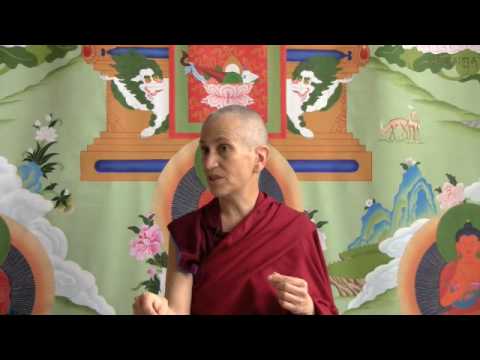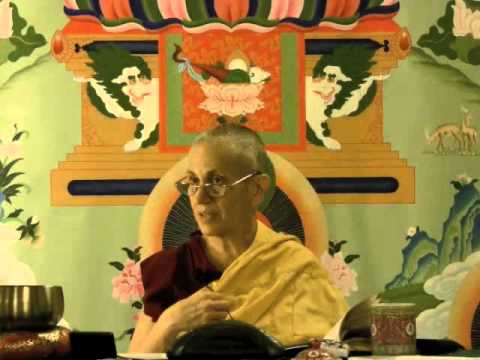Designating labels: Rinpoches and lamas
Part of a series of Bodhisattva's Breakfast Corner talks given during the Green Tara Winter Retreat from December 2009 to March 2010.
- Emptiness does not mean that anything can be called anything
- The titles given in Tibetan Buddhism can depend on a lot of different things
- It’s important to look at the qualities of a teacher rather than just a title
Green Tara Retreat 057: What is a rinpoche and designating a label (download)
We have a very interesting question here: “With regard to the need of a valid basis of designation being needed to bear a label, I could claim to be and call myself the Queen of England, dress like the Queen of England, have matching corgis [the same type of dogs the Queen owns], and even a small following. But that would not be enough to make me the Queen of England.”
Correct.
[Question continues] “Now and then in the West one hears of somebody claiming to be a rinpoche, someone who is not recognized by any of the lineages. Any individual can name themselves rinpoche and be sure that some followers will gather around them, it seems.”
Correct.
[Question continues] “Those who question this lack of a valid basis of designation to bear the name rinpoche often come up with the argument that because everything is empty, and because we are not omniscient, anyone can in fact be anything. “Who are we to know?” This is said. “We aren’t omniscient. We don’t know what level of attainment somebody has. They could be a buddha, they could be a high bodhisattva. Who are we to know? Therefore we shouldn’t criticize.” So how should we look at and respond skillfully to situations like this?”
First of all, even somebody having a title from a lineage doesn’t necessarily mean that they’re a valid rinpoche (if you’re defining rinpoche as somebody who’s a recognized incarnation of a great master). Even His Holiness has said that somebody, because of a great accumulation of merit in a previous life (even though they may not have even entered the path of accumulation, the first path), because of the great merit they could be selected as a child and called a rinpoche, and given that kind of training and so forth. Plus sometimes they make mistakes. Sometimes it can be a very political process too—only we’re not supposed to say that!
Aside from all that, then you get the ones who, as His Holiness says, are completely unknown or almost unknown in the Tibetan community. They come to the West and they are rinpoches. Or, Westerners who declare themselves to be rinpoches without having something validated by His Holiness or another high lama. Sometimes even being validated by a high lama doesn’t mean that person necessarily is a rinpoche or that they have realizations. There are a lot of other factors that go into this kind of thing: like I said, karma, and skillful means, and politics, and all sorts of things.
But in this situation where somebody’s saying or declares himself a rinpoche, you come along and question it and you’re told, “Well, if you’re not omniscient and everything’s empty anyway, couldn’t anything be anything? You’re not omniscient so how do you know what this person is?” It’s true we’re not omniscient. It’s true. I don’t know about you but I’m not omniscient. It’s true, anybody could be a highly realized being.
The purpose of them telling that to us is so that we don’t get a negative mind and criticize, and start calling that person names, and get really a horrible, negative, critical mind. Why? Because having a horrible, negative, critical, angry, resentful, jealous, antagonistic, mind harms our own virtue. We want to avoid having a negative mind in order not to harm our own merit and our own virtue. So that’s a technique for us to say, “Well, I’m not omniscient so I don’t know somebody’s level of realization.” That’s a technique for us to apply to not get a negative mind. That doesn’t mean that the person is definitely a rinpoche. You still have to function within normal, conventional reality.
Remember I was saying, like in tantric practice, there’s the practice of seeing everybody as a deity. Okay, well, just because I see Reggie as a deity, it doesn’t mean he doesn’t have an ear infection and it doesn’t mean his ear doesn’t hurt. I’m trying to see him in that way so that I don’t get angry. Why I’d get angry? I don’t know, but I’m sure I could find a reason. You do that as a protection to your own mind. But it doesn’t mean that he’s a deity.
Similarly, if I practice that kind of thing, “Well, I’m not omniscient; I don’t know who somebody is.” I use that to protect my own mind, but it doesn’t mean that that person is whatever they claim to be. We still have to function within conventional reality. People can claim to be all sorts of things. People have fake passports. Just because you have a passport doesn’t mean you are that person. So similarly, it depends on how you define rinpoche—because it’s a title that’s given actually in a bunch of very different situations to mean different things. If you have any of those then you still have to have a valid basis of designation.
If somebody calls themselves something they’re not, this happens all the time, doesn’t it? We do it. “Oh, I’m not angry. Really, I’m not angry at all. I’m just saying this completely for your benefit.” And we really believe it. Maybe we’re not even seeing our own mind, that there is some anger there. So people say things about themselves that are inaccurate. It happens all the time. Even, “Oh, I’m so poor quality. Nobody loves me.” We say that all the time. It doesn’t mean it’s true.
Audience: I’m a little confused because the definition of emptiness in that letter says that emptiness means anything can be anything. That’s not the definition of emptiness.
Venerable Thubten Chodron (VTC): Exactly, yes, thank you for bringing this up. The fact that things are empty of true existence does not mean anything can be anything. It doesn’t mean that at all. This is also where people really can go astray in tantric practice, when they have this kind of notion of emptiness. “Oh, it means I can do this and I can do that because it’s all empty.”
There are certain levels of very highly realized people—like Tilopa. He was killing fish and frying them and eating them, but he could also bring them back to life. So if Tilopa says, “I can kill,” that’s one thing. But if I go and kill fish, and fry them, I can’t bring them back to life. I’m harming sentient beings. The fact that things are empty doesn’t mean that anything goes. In fact, they say when you realize emptiness your conviction in karma and in cause and effect becomes more profound. Why? If you have a correct understanding of emptiness you see that it fits completely with dependent arising.
Audience: What are a couple of the more common understandings of the term rinpoche because I’ve heard so many things? What are the most common?
VTC: The most common understandings of rinpoche. It’s used very often to identify somebody who is a reincarnation of a great master. Now, what level of realization [did] that previous great master have? We don’t know. Like I said, we don’t always know if somebody has been properly identified. But that’s one of the usages. Another use of the word rinpoche is as a title of respect, for example, the abbot is called Khen Rinpoche which means “the precious abbot.” The previous abbot or the former abbot is Khensur Rinpoche. That’s why we have so many Khensur Rinpoches visiting the Abbey. It’s because they’ve been former abbots of some of the monasteries. Sometimes to one’s own teacher you say Gen Rinpoche. Some people do that, some people don’t. The whole use of titles in Tibetan Buddhism is really all over the board and very difficult.
As for the title lama, some people do a three-year retreat and they get the title lama. In other traditions, lama is only given for somebody who’s really a very well-respected teacher. Not even all teachers are called lama. In other cases, His Holiness says, if somebody has students, the fact of having students means they can call you lama—because lama just means teacher. It means so many things in different situations. Sometimes people who are not lamas call themselves lamas. People who are lamas don’t like to be called lamas. So this is again why His Holiness says, “Don’t look at titles. When you’re choosing teachers, really observe them over a period of time and see what their qualities are. Don’t just go by titles.”
What very good questions this person asked.
Venerable Thubten Chodron
Venerable Chodron emphasizes the practical application of Buddha’s teachings in our daily lives and is especially skilled at explaining them in ways easily understood and practiced by Westerners. She is well known for her warm, humorous, and lucid teachings. She was ordained as a Buddhist nun in 1977 by Kyabje Ling Rinpoche in Dharamsala, India, and in 1986 she received bhikshuni (full) ordination in Taiwan. Read her full bio.


